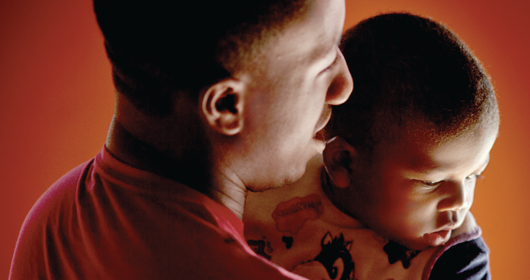
Annie E. Casey Foundation
.
Children with an incarcerated parent often suffer emotionally, academically and financially, and too few policies consider their needs, says a new report from the Annie E. Casey Foundation.
Nationwide, more than 5.1 million children have experienced separation from a parent because of incarceration — a situation that can be as difficult as dealing with abuse or domestic violence, said the report, “A Shared Sentence.”
Research shows children may experience increased mental health issues, such as depression and anxiety, and children of incarcerated mothers, in particular, are more likely to drop out of school.
“Our nation’s overreliance on incarceration has left millions of children poorer, less stable and emotionally cut off from the most important relationship of their young lives,” said Patrick McCarthy, president and CEO of the foundation, in a news release.
A reduced reliance on mass incarceration would help families, but policymakers and communities also can take shorter-term steps to improve children’s lives, the report said.
[Related: Prison Punishes Criminals’ Children, Panelists Say]
The foundation made recommendations in three areas: supporting children directly during and after a parent’s incarceration, connecting parents to employment when they re-enter the community, and building stronger communities that promote family stability and opportunity.
Proposals to help children include:
- Encouraging judges to consider families when making sentencing and prison-assignment decisions,
- Helping caregivers with financial, legal, health, child care and housing assistance when they step in to care for a child,
- Supporting community-based organizations that foster children’s well-being.
Sandra Barnhill, founder and national president of Foreverfamily, an Atlanta nonprofit that works with the children of incarcerated youth, said it is critical not to demonize parents.
“Unless we really acknowledge the important role that parent plays in that family or in the children’s life, we do a disservice to families, parents and even to re-entry,” she said.
The group organizes trips so children can visit their parents in prison, provides after-school programming for children and youth who have incarcerated parents, and offers training and technical assistance to other organizations, including a toolkit for after-school providers that is expected to be released later this year.
Barnhill said out-of-school time leaders who are looking to support children who have an incarcerated parent should be mindful of preserving families’ privacy and avoiding stigmatization. Society is not often kind or understanding about what children are going through, she added.
“We have to raise public awareness. These children cannot continue to be invisible,” she said.
Additional recommendations
To encourage employment, the recommendations include building better prison education programs, passing ban-the-box legislation and suspending child support orders.
And, to strengthen communities, the report advises building a supply of safe and stable housing.
“Leaders can take action right now to support children from the moment their families come in contact with the criminal justice system,” Scot Spencer, Casey’s associate director of policy and influence, said in a news release.
More related articles:
Report Helps Police Protect Kids While Arresting Their Parents